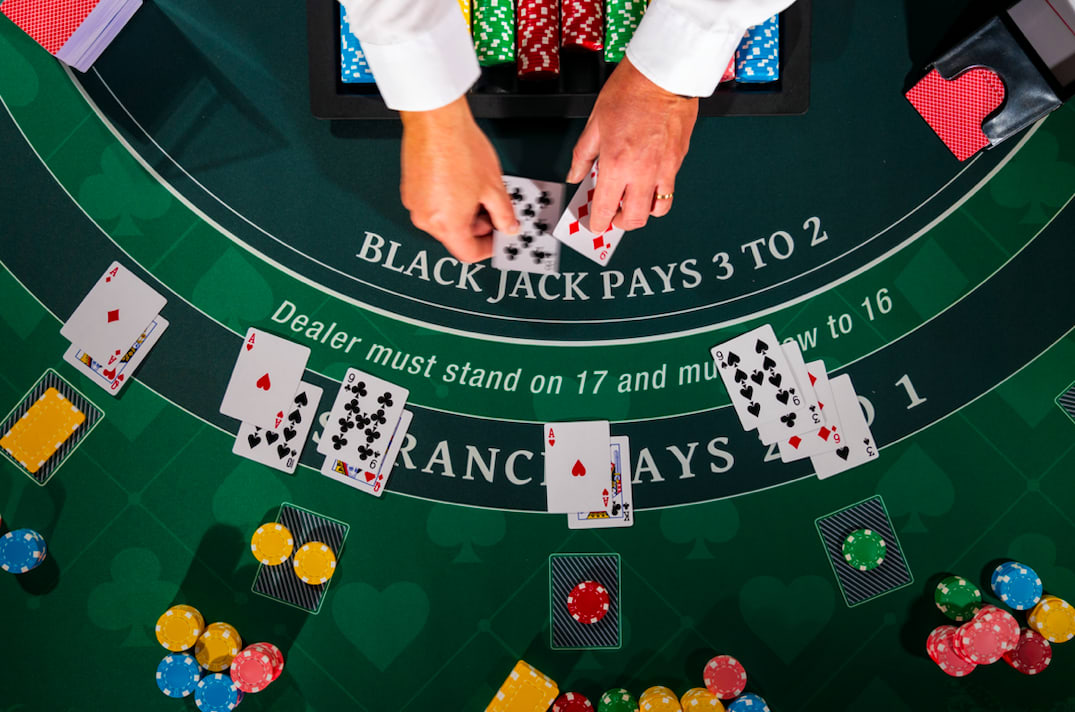In the casinos that popped up during the mid 1900s in Las Vegas, gambling was alive and thriving, razor-sharp and dangerous. Cut to the present day, the noise of slots has been replaced with the noise of online casinos which has taken the betting industry to the comforts of our home.
This article enlightens this rather interesting evolution by analyzing the role and the shift of society towards the technology in gambling. This evolution may be important to understand because understanding it allows not only following the industry’s development but also evaluating the effect on later-technology products that must appear and operate in the gradually transforming world. For instance, it is well stated that the global online gambling market is forecast to be $ 127.3 billion by the year 2027 and it indicates the growth towards online casino platforms like DraftKings Casino. This topic also enables us to disclose the major social paradigms that persistently impact the tendency of gambling culture but at the same time, points to definite perspectives and challenges of the key actors, from the viewpoint of digitalization progress. It is now appropriate to drown in the sea of the shifts in gambling in the past, now, and next.
Traditional Gambling Culture: Then
Historical perspective on traditional gambling settings (casinos, racetracks, etc.)
Gambling culture has far historical origins comparable to intelligence and antiquity, which may testify to the fact that even ancient people eagerly indulged in games of chance. In the 17th and 18th centuries, professionalism of these activities started through the gambling houses which offer structured services for the betting and wagering. Towards the end of the 19th century there were large magnificent casinos that were opened in European countries which represented the luxury and the interaction between people; racetracks were opened for those people who loved horse racing. Such conventional conditions provided not only simple profitable contacts but also prospects for leisure, communication, and even claims to dignified rank upgrades. The glamorous casino or the spectacle of the racetrack gave an entirely different aura and meant the entrenchment of gambling into the society.
Social aspects and rituals associated with traditional gambling
The real-money gambling environments of the past featured strong social components and activities that added to the appeal of gambling activities no matter how they are defined. Casinos and racetracks provided a place for people to convene, join, and calm down, although mainly to play, but also to network or have a party. Aspects like putting on formal clothing, spitting on dice are some of the superstitions and even making fellowships over betting procedures were all a part of it. They ensconced an environment approach towards initiating a feel among the patrons that they were in for something extraordinary, thus culminating in laying the pedestal for the thriving culture of traditional gambling. The samples of success and failure, the information exchange, and the concurrency of joy or surprise when observing the race or game results are the evidence of the social relevance of these environments.
Impact on local economies and communities
Live casinos and racetracks mainly exist in areas that directly affect the plight of a particular economy or community. It fulfilled this purpose because it was a large economic power house that generated tourism and created economic activities like hotels, restaurants and shops. The appearance of many tourists brought a lot of money, and they helped finance public needs and construction of facilities. Furthermore, these gambling settings established numerous employment chances in terms of more games and security sections as well as hotels, bringing about economic development and orderliness in their host regions. Nevertheless, such advantages were often coupled with difficulties, including the occurrence of crime rate and social problems linked to possible gambling. Nevertheless, the economic contributions affiliated to traditional gambling venues remain very crucial in influencing the financial attributes of many places.
Transition to Online Gambling: The Shift Begins
Emergence of online gambling platforms
Online gambling emerged during the second half of the nineties with the propagation of the internet as a new media that influences people’s experience with games of chance. Pioneering online gambling sites offered virtual renditions of offline casino games such as poker, blackjack, and online slots to be played from PC’s. These platforms attract players very fast because they are convenient and the idea of being able to play slots from the comfort of their homes. It gained more and more popularity as the years went by and with the improvement of the technologies for video game production, such as improved software and graphics, and safe payment options for consumers. This shift can be deemed as a starting point of a new level in the evolution of gambling as the possibilities in the virtual world were virtually limitless.
Advantages and challenges of transitioning to online gambling
Switching to online gambling had its pros, which entailed flexibility in time and space as well as diversity of games, convenience not confined to geographical location. Gamblers were able to wager on games without having to physically go to the venues, thus, time and money would be conserved. The same can also be said about additional options like bonuses, promotions, and loyalty programs which contributed to involving more people into internet gambling. Nevertheless, this change was accompanied by some difficulties. Others include, security threats such as hacking, scams together with the likelihood of more cases of problematic gambling as a result of increased access to the games. There was a significant shift to regulate the new trend to uphold the principles of fair play, consumers’ interests and ethical issues arising from online gambling.
Impact on accessibility and reach of gambling activities
Thus, the opening of online gambling led to the higher availability and use of gambling services. The physical tend points of gambling withdrew from just regular building structures and instead could be accessed anywhere that the internet was accessible. This sort of inclusiveness led many individuals regardless of demographical or geographical differences to be able to participate and therefore increasing the world’s player demographic. For convenience, mobile technology also improved accessibility and allowed users to gamble on mobile phones with touch screens and tablets. Therefore, online gambling platforms might offer a variety of options that might include all from; live dealer games, sports betting, and eSports among others. However, it established the market and produced substantial income while making the access for the vulnerable groups easier, setting up the requirement for enhancing the appropriate measures to prevent gambling.
Changing Dynamics in Gambling Behavior
Comparison of traditional vs. online gambling habits
A comparison of traditional gambling and online gambling tells us that the two are very different in terms of the setting, social interactions, and players’ behaviors. Hence, the experience in such places such as casinos and racetracks is social, as players interact face-to-face, are aware of the environment, and follow certain patterns. These factors create a sense of comradeship and frequently entails a longer and systematically arranged period of gambling. On the other hand, online gambling is convenient and flexible since the players can play in short, frequent, separate games and at any place. This alteration has changed the frequency and duration of gambling activity and Internet participants gambling at a higher frequency but for a shorter period of time. It also eradicates the social aspect of gambling as there are no people the players can interact with physically, thereby making it easier for them to try out new games and stakes.
Influence of technology on the evolution of gambling behavior
Analysis of the contemporary nature of gambling suggests that the application of technology has stretched the idea of gambling and deepened the gambling experience. Currently, enhanced procedures of artificial intelligence and algorithms adjust gaming promotions according to preferences and this leads to increased rates of consumers’ loyalty. Some options of the online platforms include live dealers and/or virtual reality which provide the feeling of the genuine casinos but with more comfort. Sometimes the inventions such as the blockchain technology are employed to avoid rigging and offer the viewers a fair chance. Moreover, technology has also made social components like the leaderboards and the multiplayer added to the gameplay, this way the major part of the online gambling games still stays lonely but has features that are somewhat more socialized.
Rise of mobile gambling and its implications
The former has seriously altered the face of gambling by making it more mobile and easily accessible than ever before. Convenience also appears to be an even bigger draw to the players due to the use of smart technologies such as the Smartphone, tablets and portable computers; gambling has become free from physical addresses and the traditional desk topying. This has caused an immense increase in the number of people who gamble as well as the intensification of gambling activities. As mobile apps have features of speed, convenience and ease of use, they promote a more frequent and irregular pattern of gambling. Nonetheless, it means the existence of some problematic side effects that are related to the constantly high availability of betting options, including the given problem of increased risk of problem gambling. Also, the group of players significantly changed, and now young people who actively use electronic devices for gaming are frequenting online casinos. Thus, it is pertinent for investigating mobile gambling’s consequent queries such as ever evolving regulation and responsible gambling as the adoption of this technology increases.
Regulatory Challenges and Responses
Legal considerations surrounding online gambling
The current legal position on Internet gambling is quite an elaborate one and the position differs from one country to the other. Most nations have policies that check and regulate gambling or have no solid policies or fragmented ones in place. Some legal issues might concern licensing requirements, anti-money-laundering measures, and the prevention of minors’ and vulnerable persons’ interactions. Many governments and regulatory authorities face the problem of legislative regulation of online gambling, trying to distinguish between the games of chance and skill games. Also, the internet crosses political boundaries, and the operators could be based in one country while offering their services to the players in another country. This makes it necessary for the business to have sound legal structures that would check on the organization for compliance, avert illegality, and handle some major concerns including taxation and consumers.
Regulatory responses to the growth of online gambling
Different regulatory measures have been taken in regard with the various appearances of online gambling that concerns more and more people every day. Almost all the countries around the globe have set up a regulatory agency to regulate online gambling and ensure compliance with the set license. These authorities enforce policies for instance, the mandatory programs for self exclusion, restrictions to the advertising of bets, and promotion of gambling that are in a bid to reduce the effects of betting on the internet. Certain countries have even developed legal regimes related to the certain spheres of online gambling such as payment services, data privacy, and so on. Also, there has been a growing cooperation between the respective regulatory bodies across the world in response to online gambling that has no boundaries and in an effort to learn from each other.
Balancing consumer protection with industry innovation
This is a major consideration that should be observed when regulating online gambling so as to protect the consumers while at the same time allowing innovation among the industries. On one hand, regulating authorities should protect players from the potential negative results like gambling addiction, cheating, and abuse. This includes the use of measures such as age verification, spending limits as well as easy access to help people with gambling problems. But, on the other side, regulators have to provide favorable conditions for the constant innovations and the overall development of the markets. Sustaining this balance of the flexibility of accepting new changes and the stringency of players’ safety measures is not easy at all. Regulations being developed and implemented should involve the assistance of industry participants and consumer protection agencies where this is possible in an effort to strike the right balance that allows new entrants in the market without compromising on consumer protection. It is possible to make positive changes and continue the development of the industry through the introduction of ethical standards and unique technologies.
Social Implications of Modern Gambling Culture
Discussion on the social impact of online gambling
There is thus a wide range of effects of social aspects of online gambling that cut across various spheres of an individual’s lifespan, as well as societal systems. On the one hand, online gambling is convenient and entertaining, which enables the consumers to be socially involved and help the economy. It enables people to be connected to other people with similar interests; this forms groups and social networks. However, it can also result to social awkwardness whereby, people will spend most of their time gambling on the internet rather than with actual people. Moreover, the absence of personal controls and the openness of Internet betting leads to worsened conditions concerning disordered gambling, funding problems, and psychological health. The accessibility is also a problem in terms of allowing underage gambling and the population’s vulnerability to gambling.
Effects on problem gambling and addiction
Thus, the shift in the mode of gambling has had far-reaching consequences on the subject of problem gambling and addiction. Due to the fact that the internet is constantly accessible and many of the sites are extremely engaging and provocative for the users, the level of compulsive gambling might escalate. It is specifically revealed that online gambling provides easily accessible rewards, with automation of the task and continuation of the game when, for that reason, leads to pathological gambling. Another disadvantage is that, since people gamble from the comfort of their homes they are also unknown to other people and the signs of an addict cannot easily be noticed by friends and family members. Effects of problem gambling include debt, misunderstanding and conflicts in familial and friendly relations and mental problems such depression and anxiety. Mitigating these factors calls for specific programs and assistance to enable people to fight their gambling disorders.
Responsible gambling initiatives and their effectiveness
Rehabilitation programs are useful in reducing the ills of gambling and enhancing safer gambling practices. It will be pertinent to discuss these initiatives as self-exclusion programs, deposit limits and awareness creation initiatives among other things. There are different options that guarantee a certain level of control over the activities carried out through Internet sites and applications that offer gambling entertainment, including setting loss and time limits. Governments and stakeholders in the gambling industry also participate in framing of guidelines and code of conducts governing the legal gambling activities. Despite these efforts, it has been evident that these interventions have some measure of effectiveness in preventing additional harm and caring for vulnerable people, albeit their success rates being highly contingent on the degree of their application and in terms of the volunteers’ compliance to these resources. It was also gathered that effective strategies to prevent compulsive gambling should be closely monitored and reviewed from time to time because of changes in the modern society’s gambling culture.
Future Trends and Predictions
Forecasting the future of gambling culture
Based on the existing trends in technological advancement, gambling cultural future is going to be defined by a combination of technological advances, regulatory environments, and social trends. Traditional forms of betting will and continue to be amalgamated with advanced technology hence creating more sophisticated ways of gambling. Thus, VR and AR are expected to diversify online casinos transforming it into a virtual environment that emulates the atmosphere of a real casino. Moreover, the existence of cryptocurrency and, in general, the phenomenon of blockchain technology may open additional possibilities to implement genuine and immutable betting. More movement towards safe gambling will be observed at the social level due to rising concern with gambling addiction and mental disorders. This will also cause existing regulation authorities to adjust to these changes with legislation being brought up to date with the fast growing industry.
Technological advancements shaping the industry
The gambling and betting industry is experiencing a shift based on acquisitions in the technology front. Modern tools like artificial intelligence and machine learning are being leveraged to improve the users’ experiences through individualized suggestions regarding games and identify instances of potential gambling disorders. Blockchain technology has an apparent potential of providing safe and open information on numerous issues and smart contracts can enhance general operations of online gambling facilities. Coming to the area of using VR and AR technologies, it is clear that these technologies will dramatically change the prospects of gaming by providing incredibly realistic environments that will allow a player to actively participate in the game. In addition, social media remains an ever-advancing factor that continues to push mobile gambling as a form of gambling that can easily be undertaken on portable devices. These technologies do not only enhance the quality of games, thus enhancing players’ experience but also present means and ways in enacting healthier regulations amid the gambling world.
Potential changes in consumer preferences and behaviors
Customers’ attitudes and approaches within the context of the gambling sector are predicted to undergo a shift in the near future. Having younger and especially more technical generations leading the way, it is expected to witness the application and request of modern and exciting games. Online social gaming, a convergence of social networking and online gambling, is expected to prevail since it encourages social interactions in gaming. The features such as convenience and flexibility that is associated with mobile gambling make players indulge in shorter but more frequent sessions of gambling. Furthermore, there is a trend towards responsible gambling, persons actively searching for sites with the extensive set of tools to control their gambling. Another factor is sustainability and ethical issues that will also matter in the future as more and more people pay their attention to corporate social responsibility. Such changes are likely to relate closely as it will be forced to reinvent itself over and over again to meet new challenges.









